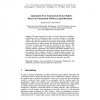Free Online Productivity Tools
i2Speak
i2Symbol
i2OCR
iTex2Img
iWeb2Print
iWeb2Shot
i2Type
iPdf2Split
iPdf2Merge
i2Bopomofo
i2Arabic
i2Style
i2Image
i2PDF
iLatex2Rtf
Sci2ools
120
Voted
IICAI
2007
2007
Automated Test Generation from Models Based on Functional Software Specifications
The paper presents first results of a project that aims at building a model-based tool for functional testing of control software for passenger vehicles. The objective is that this tool can be used in today’s engineering practice and, hence, the approach must not require costly changes in the current test generation process and not assume data and skills that do not exist in reality. We focus on design decisions that are motivated by this objective. The proposed solution offers a natural-language-template-based interface for acquiring software requirements. The content of the filled-in templates can be represented in propositional logic and temporal relations and form the model of the intended correct behavior. Models of potential faulty behaviors are generated from this OK model by a number of (types of) transformations. The fault types are defined mainly to match the intuition behind manually generated test cases and, hence, can deliver similar, but more systematic, test suites.
Artificial Intelligence | IICAI 2007 | Potential Faulty Behaviors | Test Generation Process | Today’s Engineering Practice |
Related Content
| Added | 29 Oct 2010 |
| Updated | 29 Oct 2010 |
| Type | Conference |
| Year | 2007 |
| Where | IICAI |
| Authors | Michael Esser, Peter Struss |
Comments (0)

